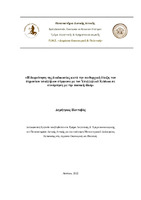| dc.contributor.advisor | Τσούντας, Κωνσταντίνος | |
| dc.contributor.author | Πανταβός, Δημήτριος | |
| dc.date.accessioned | 2022-11-04T07:47:53Z | |
| dc.date.available | 2022-11-04T07:47:53Z | |
| dc.date.issued | 2022-10 | |
| dc.identifier.uri | https://polynoe.lib.uniwa.gr/xmlui/handle/11400/3316 | |
| dc.identifier.uri | http://dx.doi.org/10.26265/polynoe-3156 | |
| dc.description.abstract | Σύμφωνα με την παρ. 1 του άρθρου 103 του Συντάγματος (Φ.Ε.Κ. 120/27-06-2008, τ. Α΄) «οι δημόσιοι υπάλληλοι είναι εκτελεστές της θέλησης του Κράτους και υπηρετούν το Λαό». Την ίδια όμως στιγμή οι δημόσιοι υπάλληλοι δεν παύουν να είναι και πολίτες της Ελληνικής Δημοκρατίας. Η διφυής αυτή κατάσταση θέτει τον δημόσιο υπάλληλο σε ένα ιδιαίτερο καθεστώς, με επιπλέον υποχρεώσεις και περιορισμούς, καθώς ως εκτελεστικός βραχίονας του Κράτους, αναπτύσσει οικειοθελώς μία ιδιαίτερη εξουσιαστική σχέση με αυτό. Η σχέση αυτή αποτυπώνεται κατ’ εξοχήν στο Πειθαρχικό Δίκαιο, το οποίο διέπει τους δημοσίους υπαλλήλους και αποτελεί μέρος του Υπαλληλικού Κώδικα. Αντικείμενο της παρούσας εργασίας είναι η διερεύνηση της διαδικασίας κατά την πειθαρχική δίωξη των δημοσίων υπαλλήλων σύμφωνα με τον Υπαλληλικό Κώδικα σε συνάρτηση με την ποινική δίκη. Στο πλαίσιο αυτό παρουσιάζονται οι αλλαγές στο Πειθαρχικό Δίκαιο των δημοσίων υπαλλήλων από τον πρώτο Υπαλληλικό Κώδικα του 1951 μέχρι σήμερα, ώστε, σε συνδυασμό με την ανάλυση και την αντιπαραβολή της πειθαρχικής διαδικασίας με την αντίστοιχη ποινική και της μεταξύ τους σχέσης, να αναδειχθεί το ιδιαίτερο καθεστώς ελέγχου και λογοδοσίας στο οποίο καλούνται να λειτουργήσουν οι δημόσιοι υπάλληλοι έναντι του εργοδότη τους. Μεθοδολογικά, η συγγραφή της εργασίας θα στηριχτεί στην έρευνα των σχετικών πρωτογενών πηγών, ήτοι τον ισχύοντα και τους παρελθόντες Καταστατικούς Χάρτες της χώρας, τη σχετική νομοθεσία και νομολογία των δικαστηρίων και του Νομικού Συμβουλίου του Κράτους. Η προσέγγιση των ιστορικών πηγών θα συνδυασθεί με τη μελέτη της σχετικής βιβλιογραφίας και αρθρογραφίας, έντυπης και διαδικτυακής. Η προσέγγιση αυτή αποσκοπεί στην αποτύπωση της ειδικής σχέσης του δημοσίου υπαλλήλου με τον εργοδότη του μέσα από το πειθαρχικό δίκαιο, με έμφαση στο τι έχει αλλάξει και τι έχει παραμείνει σταθερό από την αρχή της μεταπολεμικής περιόδου μέχρι σήμερα στον πειθαρχικό έλεγχο του δημοσίου υπαλλήλου. | el |
| dc.format.extent | 133 | el |
| dc.language.iso | el | el |
| dc.publisher | Πανεπιστήμιο Δυτικής Αττικής | el |
| dc.rights | Αναφορά Δημιουργού - Μη Εμπορική Χρήση - Παρόμοια Διανομή 4.0 Διεθνές | * |
| dc.rights | Attribution-NonCommercial-NoDerivatives 4.0 Διεθνές | * |
| dc.rights.uri | http://creativecommons.org/licenses/by-nc-nd/4.0/ | * |
| dc.subject | Δημόσιοι υπάλληλοι | el |
| dc.subject | Υπαλληλικός κώδικας | el |
| dc.subject | Πειθαρχική διαδικασία | el |
| dc.subject | Ποινική δίκη | el |
| dc.subject | Πειθαρχικό δίκαιο | el |
| dc.title | Η διερεύνηση της διαδικασίας κατά την πειθαρχική δίωξη των δημοσίων υπαλλήλων σύμφωνα με τον Υπαλληλικό Κώδικα σε συνάρτηση με την ποινική δίκη | el |
| dc.title.alternative | The investigation of the procedure regarding the disciplinary prosecution of civil servants under the Civil Service Code in relation to the criminal proceedings. | el |
| dc.type | Μεταπτυχιακή διπλωματική εργασία | el |
| dc.contributor.committee | Παπαηλίας, Θεόδωρος | |
| dc.contributor.committee | Δεδούλη, Αικατερίνη | |
| dc.contributor.faculty | Σχολή Διοικητικών, Οικονομικών & Κοινωνικών Επιστημών | el |
| dc.contributor.department | Τμήμα Λογιστικής και Χρηματοοικονομικής | el |
| dc.contributor.master | Δημόσια Οικονομική και Πολιτική | el |
| dc.description.abstracttranslated | According to article 103, paragraph 1 of the Constitution of Greece (Government Gazette 120/27-06-2008, issue Α΄) «civil servants shall be the executors of the will of the State and shall serve the people…». At the same time, civil servants still are citizens of the Hellenic Republic. This twofold situation sets the civil servant in a unique state with additional obligations and restrictions, because his role as the executive branch of the State develops a special authoritative relationship towards the State in a voluntary manner. This relationship is reflected on the Disciplinary Law, which underpins civil servants and makes part of the Civil Service Code (CSC). Our Thesis shall examine the process of disciplinary action against civil servants according to the CSC in correlation to the criminal procedure. In this framework, the changes in the Disciplinary Law of the civil servants are exhibited from the first CSC of 1951 until nowadays, in order to, along with analyzing and comparing the disciplinary proceedings and the relationship in-between, highlight the special controlling and accountability status in which the civil servants are called to function in relation to their employer. In terms of methodology, the present Thesis shall be based on the research of the relevant primary sources, i.e. the valid and former national Constitution Charters, the relevant legislation and case-law of the referring Courts and the Legal Council of the State. The approachment to the historical sources shall be combined with the study of the relevant bibliography and reporting, both in print and online. This approach aims at documenting the special relationship between the civil servant and its employer through disciplinary measurement, by putting emphasis on what has suffered change and what has remained stable from the beginning of the Post-War era until nowadays in regards to the disciplinary control of the civil servant. | el |


